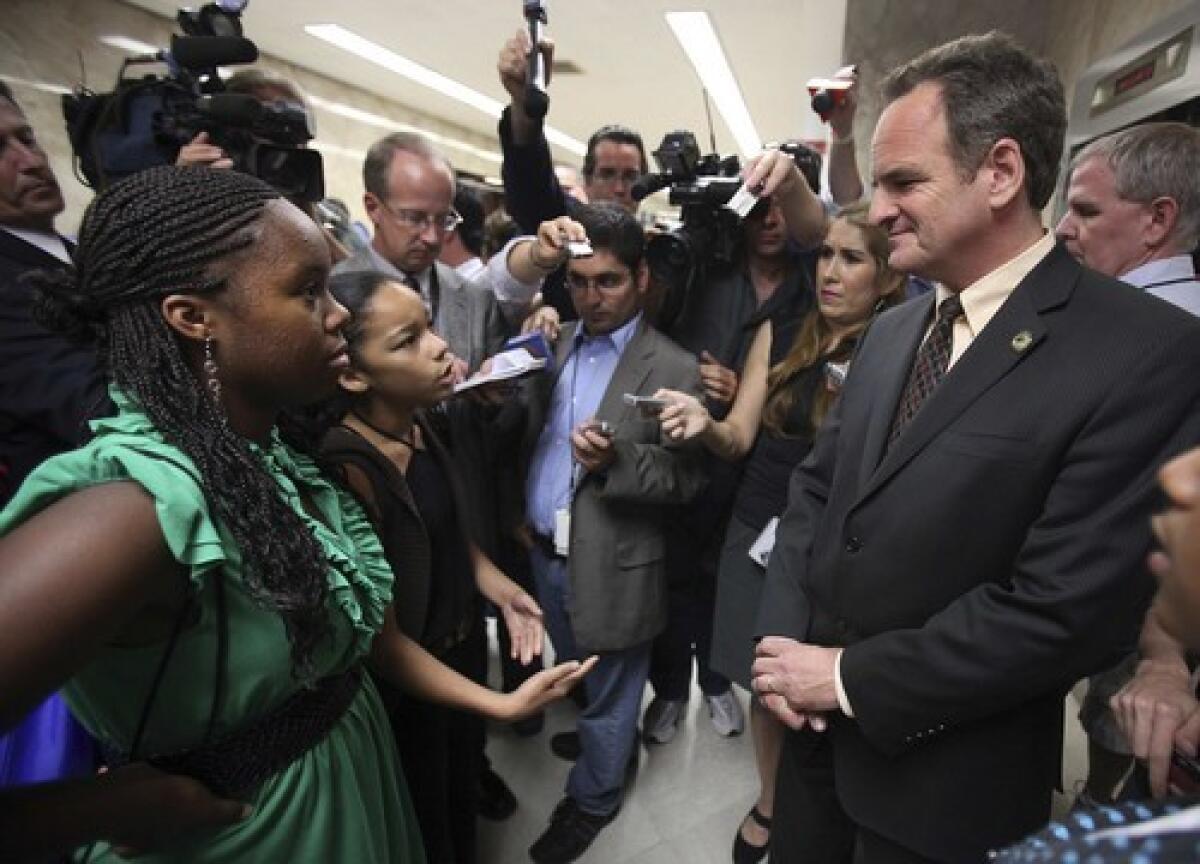Vote on prison plan in California budget is delayed

- Share via
Reporting from Sacramento — Gov. Arnold Schwarzenegger and legislative leaders on Wednesday held together their plan to close California’s $26.3-billion deficit by delaying until next month a vote on a controversial provision to reduce the amount of time that thousands of inmates spend in prison.
The decision followed a blowup a day earlier in which Assembly Republican leader Sam Blakeslee of San Luis Obispo said after the details became public that he had no knowledge of the prison plan and threatened to withdraw his support for the entire budget deal if the proposal to cut the inmate population by 27,000 was included.
The plan, which won endorsement from a police chiefs group Wednesday, would allow the state to place on home detention prisoners with a year left on their sentences and those who are elderly or infirm, and to change sentencing and parole rules to reward offenders who show evidence of rehabilitation.
Blakeslee and some police groups have labeled the corrections proposal “early release,” a politically volatile concept that lawmakers and the Schwarzenegger administration say is a mischaracterization. But Democratic legislative leaders agreed to put off dealing with the issue to defuse the dispute.
“Everything’s on track,” Senate President Pro Tem Darrell Steinberg (D-Sacramento) said as he and Assembly Speaker Karen Bass (D-Los Angeles) emerged from a meeting with the governor. Blakeslee said his caucus was now ready to “move forward,” and would offer its own plan “to achieve the necessary savings without jeopardizing public safety.”
The governor, speaking to reporters, said the prison issue had caused “some misunderstandings, and we are ironing them out.”
“There will be difficult moments,” Schwarzenegger said. “But the bottom line is we’re going to get this budget done.”
The governor also dismissed criticism that he had been insensitive to those who might be affected by budget cuts when he posted a video on Twitter that showed him playing with a large knife.
“You know, you sent a governor to Sacramento -- not El Stiffo, like some of the past were, but you sent someone that is a little more entertaining and has a little bit more fun,” he said. “Not that I have fun with making the cuts . . . but fun with the job itself.”
Lawmakers had hoped to vote on the budget deal tonight, but it was unclear whether they would be able to draft all the legislation in time.
Another component of the budget that continued to stoke anger was the state’s plan to borrow or take $4.7 billion from local governments. More than 180 cities have passed resolutions to join Los Angeles County in suing the state, said Judy Mitchell, mayor of Rolling Hills Estates and president of the League of California Cities.
At a news conference in Los Angeles, she described the budget proposal as a “Ponzi scheme that passes off responsibility to future governors, legislators and to our taxpayers.”
Also drawing heat was the budget’s plan to allow new offshore oil drilling for the first time in 40 years. Lawmakers and Schwarzenegger settled on a plan to allow the project near Santa Barbara County, which is estimated to raise $100 million in royalties in the coming year. State Democratic Party Chairman John Burton called Wednesday for it to be rejected, referring to it as a “sweetheart deal” for an oil company and “an affront to all Californians.”
Before the prisons proposal was put on hold, it received a boost from at least one law enforcement group, the California Police Chiefs Assn. Pasadena Police Chief Bernard Melekian, president of the association, said the plan takes “huge steps in the right direction” by including home detention and by targeting specific offenders who behave well, are sick or have the least time to serve. He said the plan was far better than an unvarnished early release of inmates that his group had feared would be approved by state leaders.
“We think that we’ve made a lot of progress,” Melekian said. “We are very pleased about that, and we anticipate working very closely with them to implement this.”
His board, which represents 338 chiefs statewide, voted unanimously to support it.
Despite the delay, the budget deal will still include $1.2 billion in cuts to the Department of Corrections and Rehabilitation, though it will not specify how they are to be made. Law enforcement advocates have routinely blocked plans that would scale back punishment of criminals in prison or parole supervision, which cost the state $10 billion a year.
When the issue is taken up again next month, GOP lawmakers hope to present their own plan, which would further cut rehabilitation programs for prisoners and slice into the budget for youth correctional facilities. Steinberg said that despite the delay, “our proposal is not going to change, and neither is the administration’s,” a sentiment echoed by aides to the governor.
Los Angeles Mayor Antonio Villaraigosa is planning to join the discussion today, city sources said, at a news conference with police department commanders and union officials to denounce state officials’ handling of the issue.
Times staff writers Shane Goldmacher, Phil Willon and Alexandra Zavis contributed to this report.
More to Read
Sign up for Essential California
The most important California stories and recommendations in your inbox every morning.
You may occasionally receive promotional content from the Los Angeles Times.













